2.4: How the Constitution Guides a National Identity and a Federal Identity
- Page ID
- 2002
Why do governments exist? One major reason is that they create rules. Which rules are necessary or desirable? That is open to debate. Different types of governments have certainly created a wide variety of rules.
Governments originated with the need to protect people from conflicts and to provide law and order. Why have conflicts among people happened throughout history? Many people, both famous and ordinary, have tried to answer that question. Perhaps human nature dictates selfishness, and people inevitably will come to blows over who gets which property or privilege. Maybe, as Karl Marx explains, it is because the very idea of "property" makes people selfish and greedy.
Whatever the reasons, governments first evolved as people discovered that protection was easier if they stayed together in groups, and if they all agreed that one (or some) in the group should have more power than others. This recognition is the basis of sovereignty, or the right of a group (later a country) to be free of outside interference.
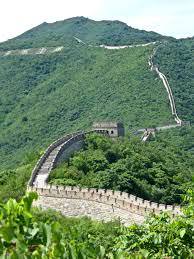
A country needs to not only protect its citizens from one another, but also needs to organize to prevent outside attack. Sometimes they have built Great Walls and guarded them carefully from invaders. Other times they have led their followers to safe areas protected by high mountains, wide rivers, or vast deserts. Historically, they have raised armies, and the most successful ones have trained and armed special groups to defend the rest. Indeed in the twentieth century, governments have formed alliances and fought great world wars in the name of protection and order.
In more recent years, government responsibilities have extended to the economy and public service. An early principle of capitalism dictates that markets should be free from government control. When economies spun out of control during the Great Depression of the 1930s and countries sank into great depressions, governments acted. The United States Congress created the Federal Reserve System in the early twentieth-century to ward off inflation and monitor the value of the dollar. Franklin Roosevelt and his "brain trust" devised New Deal programs to shock the country into prosperity.
Governments become involved with the economic workings of their countries. In the 1930s, the Federal Reserve System began to take a role in helping the American economy prevent another depression by locating currency reserves at centralized banks.
Perhaps government responsibility to provide social programs to its citizens is the most controversial of all. In the United States, the tradition began with the New Deal programs. Many provided people with relief through jobs, payments, and food. During the 1960s, President Lyndon Johnson unveiled his "Great Society" programs aimed at eliminating poverty in the entire country.
Many European countries today provide national medical insurance and extensive welfare benefits. Many Americans criticize these programs as expensive ventures that destroy the individual's sense of responsibility for his or her own well-being. So, the debate over the proper role of government in providing for its people's general welfare is still alive and well today.
General Purposes of Government
- Though the rules and responsibilities vary greatly through time and place, governments must create them.
- Governments provide the parameters for everyday behavior for citizens
- Governments must protect citizens from outside interference, and
- Governments must often (or, at least are expected to) provide for the well-being and happiness of its citizens.
The Founding Fathers and the Purposes of Government
In writing the United States Constitution, our Founding Fathers (meaning those who were directly involved in creating, debating, and adopting the Constitution) explicitly stated the purposes for which they believed governments existed. We find those purposes in the opening paragraph of the United States Constitution, called the Preamble.

Constitutional Purposes of American Government
As stated in the preamble, the specific purposes of Government in the United States are:
- To form a more perfect union (to join together the colonies)
- To establish justice (define and protect the rule of law)
- To insure domestic tranquility (to prevent conflicts within or between the states)
- To provide for the common defense (a united power opposing any attacks)
- To promote the general welfare (human rights and a stable society)
- To secure the blessings of liberty (insure that the concept of freedom endures)
-
Purpose 1: To Form a More Perfect Union
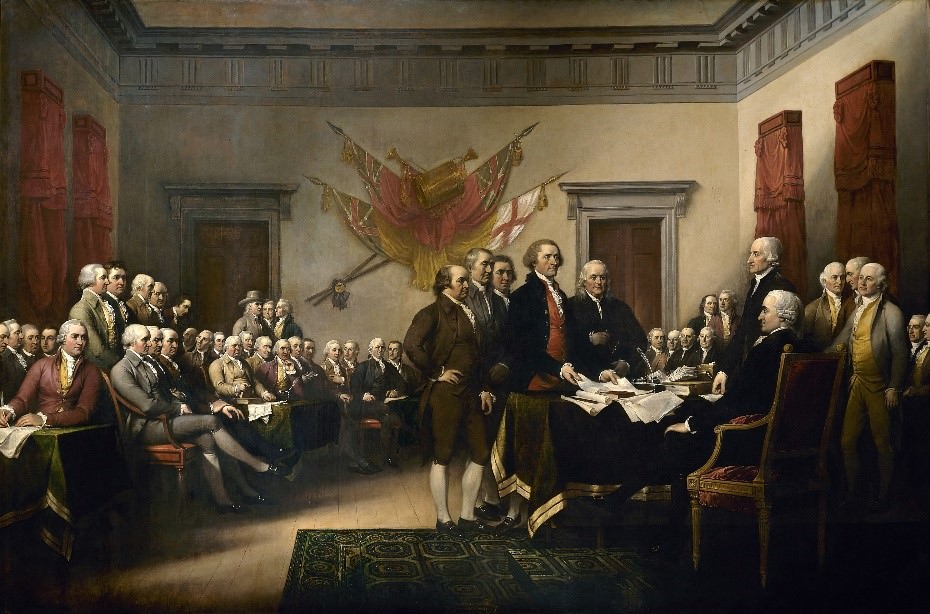
One major reason is that they create rules. Which rules are necessary or desirable? That is open to debate. Different types of governments have certainly created a wide variety of rules.
Governments originated with the need to protect people from conflicts and to provide law and order. Why have conflicts among people happened throughout history? Many people, both famous and ordinary, have tried to answer that question. Perhaps human nature dictates selfishness, and people inevitably will come to blows over who gets which property or privilege. Maybe, as Karl Marx explains, it is because the very idea of "property" makes people selfish and greedy.
Whatever the reasons, governments first evolved as people discovered that protection was easier if they stayed together in groups, and if they all agreed that one (or some) in the group should have more power than others. This recognition is the basis of sovereignty, or the right of a group (later a country) to be free of outside interference.
Video: The Constitution, The Articles, and Federalism
Purpose 2: To Establish Justice
Remember our discussion of the Rule of Law (the idea society and its institutions are subject to and accountable to a series of rules and standards that are fairly applied and enforced)? It is the government’s responsibility to ensure that laws are fairly and equitably interpreted and enforced. This is the purpose of the justice system, which, in the United States, consists of the Supreme Court and all of the lower courts established under it. In our federal system, each state establishes its own set of courts and the federal justice system also has a series of courts. But no court in the United States has more authority than the Supreme Court, which is considered the highest court in the land. Its main responsibility is to interpret and apply to the Constitution of the United States so that laws
Purpose 3: To Ensure Domestic Tranquility
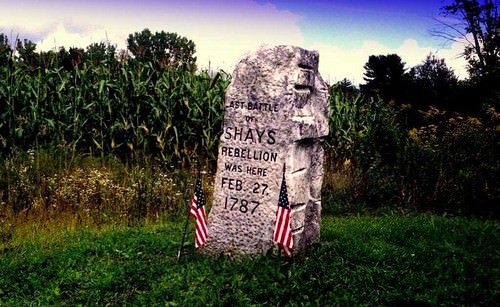
Learning through Rebellion
In the mid-1780s, the economy of the newly formed United States was in serious trouble. Hampered by its ability to raise revenue, the national government (what there was of it) owed the equivalent of hundreds of millions of dollars in today’s money from the American Revolution. Many ex-soldiers had returned to their farms but had borrowed money against their farms in order to keep them running. A series of farmers, led by Daniel Shays, marched onto a Massachusetts courthouse with hundreds and hundreds of protestors. After hearing of “Shays' Rebellion”, George Washington said, "We are fast verging to [absence of government] and confusion!"
This “crisis” made it clear that the national government needed to have the power to address domestic problems and to react to potential domestic problems. The Constitution has given the government certain powers so that they will be able to keep the peace. These are known as police powers. Local governments, along with state governments, are allowed to use their own police to enforce national laws within their own borders. However, when the crime has crossed state borders, the national police agencies, like the FBI, can step in to help protect life and property.
Video: Shays' Rebellion
Purpose 4: To Provide for the Common Defense
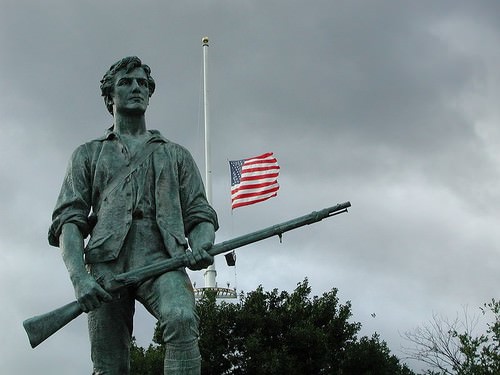
At the conclusion of the American Revolution, the Continental Army disbanded and its soldiers returned to their homes and farms. Leaving the newly formed United States with no real army with which to defend itself. Without an army, there was no way to force British troops to leave the western frontier. Without a navy, there wasn't any way to prevent Spain from closing part of the Mississippi River to the American Trade.
The framers of the Constitution realized that armed forces were vitally important to a nation's survival. Military power would help to prevent attacks from other nations, but it would also protect economic and political interests. The Constitution gives Congress enough power to "raise and support Armies" and to "provide and maintain a Navy".
Today, the armed forces consist of the Army, Air Force, Navy, Marine Corps, and Coast Guard. The Constitution also establishes the principle that the military is under civilian, or non-military, control. Article 2 of the Constitution states that the President is Commander in Chief of the armed forces. Even the highest-ranking military officer must answer to an elected official.
Purpose 5: To Promote the General Welfare
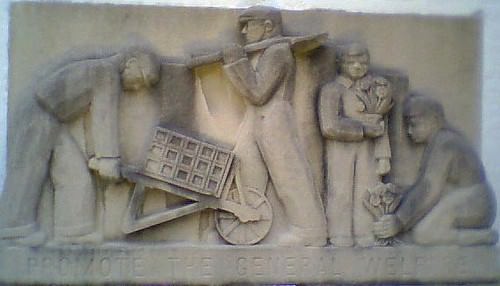
The Constitution states that the national government should promote the general welfare, but it doesn’t really define what this means. Since the 1930s, most people have come to increasingly depend upon government-provided services such as Social Security, a national system of interstate highways, federal unemployment insurance, and a variety of social welfare programs. However, in order to pay for these services the national government must collect taxes from the people.
The workplace provides tons of examples of how the national government has promoted the general welfare. Factory owners have to meet certain safety standards for their work areas. People that are disabled or are unemployed receive financial support. The Social Security system has made sure that all workers will receive income upon their retirement.
General welfare has also been promoted by supporting education. Education helps prepare people for the real world. It helps people learn to become responsible, working citizens. It provides training and tools for employment as well.
Supporting education come in many different ways. The national government has to pay for school nutrition programs in local school areas. Many students also receive money to help pay for the costs of their college education. This is called a scholarship.
Scientific research is also supported by general welfare. General welfare promotes the development of improving the quality of life. Researchers at the National Institutes of Health have led the fight against many different diseases. Without general welfare, hardly any of this would have been possible. Scientists that work at the Department of Agriculture have helped and continue to help farmers improve their crops and to develop better livestock.
Of course, the most recent controversy with regard to the government’s role in promoting the general welfare revolves around the recently implemented Affordable Care Act, also known as “Obama Care.” The debate over the role of the federal government in providing health care services and requiring every citizen to have health insurance (either privately, through their employers, or through government supported ‘exchanges’) has become increasingly tense.
The Executive Order Promoting Healthcare Choice and Competition, also known as the Trumpcare Executive Order, or Trumpcare, is an Executive Order signed by President Donald Trump on October 12, 2017, which tells federal agencies to modify how the Patient Protection and Affordable Care Act of the Obama Administration is implemented.
Along with chipping away at the landmark Affordable Care Act, the Trump administration has made a historic and controversial change to Medicaid, allowing states to require many participants who gained coverage through Obama Care to work or lose their benefits.
Trump officials say their moves are aimed at providing greater access to more affordable health insurance options. They are particularly concerned about younger Americans and those who earn too much to qualify for federal subsidies.
The government’s role in promoting the general welfare of the people extends beyond directly providing governmental services. Today, the government takes an active role in economic policy. Its objective is to provide an environment in which people are gainfully employed, prices are fair and equitable, goods are freely available, the currency (money) is secure, banks are safe, and the marketplace is open to competition. To provide these services, the government regulates some aspects of trade, insures federal banks, and provides a central banking system.
Purpose 6: To Secure the Blessings of Liberty
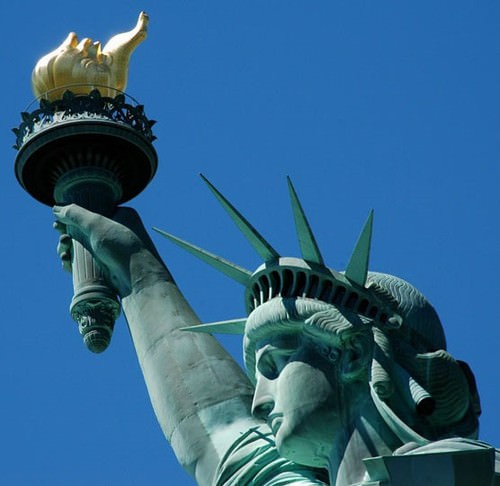
One of the main reasons colonists fought the American Revolution was for the protection of liberty (basic freedoms). For this reason, it makes sense that the framers of the constitution would have been especially concerned with securing liberty as one of its major goals. For our purposes, we will define liberty as the freedom to live as you would like, as long as you follow and obey the laws of the country, and respect the rights of others.
One way that the Constitution ensures the blessings of liberty is by limiting the power of government. The most important example of this is the Bill of Rights, the first 10 amendments to the Constitution, which outline basic rights to our freedoms. This includes freedom of speech, religion, press and assembly; the right to bear arms; basic property protections; basic protections against self-incrimination; the rights to a fair and speedy trial by a jury of ones’ peers in both criminal and civil cases; the right to be treated fairly when accused of a crime; basic protections from unfair search and seizure and cruel and unusual punishment; and a promise that the power of the government at the national and state levels would be limited with the bulk of the rights going to the people. These basic rights are not allowed to be taken away by our government (in keeping with Locke’s idea of unalienable rights).
Another way the constitution has kept liberty safe is by giving the people the right to vote. We, the people, have the right to select our leaders to help make our laws. And, we are also able to take the power away from our leaders, if we feel it is necessary.
The "blessings of liberty" have been extended to more Americans since the Constitution was written. This can be done in several ways, including amending the Constitution itself, creating new laws, eliminating or changing laws, and applying the Constitution through decisions by the Supreme Court and other courts within the justice system at the national and state levels.
Sources: x24xlaceyx24x.tripod.com/id1.html, http://www.ushistory.org/gov/1a.asp
Video: The Preamble
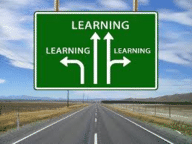
Study/Discussion Questions
Use or describe each of the following terms in a sentence.
|
Sovereignty |
Great Wall of China |
Great Depression |
|
Federal Reserve System |
“Brain Trust” |
New Deal |
|
Great Society |
Preamble to the Constitution |
More Perfect Union |
|
Justice |
Domestic Tranquility |
Common Defense |
|
General Welfare |
Blessings of Liberty |
Confederation |
1. Governments almost certainly began for what reason(s)?
2. What are the four general purposes of government? Briefly explain each one in your own words.
3. What six purposes did the founding fathers have for American Government? Where can those purposes be found?
4. Give an example from your own experience of how our system of government fulfills each of the six purposes of government.
5. Of the six purposes of government defined by the founding fathers, which do you see as being the most important today? Why?

